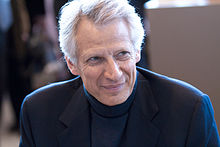Quai d'Orsay (film)
| Movie | |
|---|---|
| German title | Wild life on the Quai d'Orsay |
| Original title | Quai d'Orsay |
| Country of production | France |
| original language | French |
| Publishing year | 2013 |
| length | 113 minutes |
| Rod | |
| Director | Bertrand Tavernier |
| script |
Abel Lanzac , Christophe Blain , Bertrand Tavernier |
| production |
Frédéric Bourboulon , Jérôme Seydoux |
| music | Philippe Sarde |
| camera | Jérôme Alméras |
| cut | Guy Lecorne |
Quai d'Orsay [ kɛdɔʀsɛ ] is a French comedy film from the year 2013 under the direction of Bertrand Tavernier . She is entitled to the seat of the French Foreign Ministry on His -Ufer Quai d'Orsay in the 7th arrondissement of Paris . The film is an adaptation of the comic strip of the same name by Christophe Blain and Antonin Baudry (alias Abel Lanzac), which was honored as the best album of the year at the Festival International de la Bande Dessinée d'Angoulême .
The film was in 2013 at the International Film Festival of San Sebastian in competition for the Golden Shell shown. In January 2014, at the 39th César Awards, the film was nominated in three categories, with Niels Arestrup winning the one for best supporting actor .

action

Arthur Vlaminck is a young graduate of the École Nationale d'Administration ( National School of Administration ). He is often lucky in life, and this time, right after graduating, he managed to get a job in a prestigious position and to occupy a position that many of his contemporaries only dream of: as an employee («chargé de langage» ) on the staff of the French Foreign Ministry, which is located in Paris on the Quai d'Orsay . One of his duties is to write speeches for Minister de Worms. The minister constantly attracts the attention of women, but impresses not only with his social and financial position, but also with his personal qualities, appearance and charisma.
Due to the fact that his boss is cheerful, Arthur doesn't have to get bored at work, but he initially has a somewhat naive idea of what goes on in public institutions, but what changes over time. Arthur sees what is happening firsthand and he experiences all the joys of what it means to move in the highest circles of society. He also has to go to great lengths to maintain his place among ambitious foreign policy advisors, to learn to get along with other people and to be always vigilant to the busy minister and the political situation at hand. Intrigue, gossip, and moral inaccuracies are commonplace in his new environment.
The speech given by the Foreign Minister at the end of the film echoes the words that the then incumbent French Foreign Minister Dominique de Villepin opposed in his speech ( Et c'est un vieux pays ) to the United Nations Security Council on February 14, 2003 held a military intervention in Iraq falsely accused of possessing weapons of mass destruction . In addition, the plot is structured by quotations from the fragments of the Greek philosopher Heraclitus .
actor
- Thierry Lhermitte as the French Foreign Minister Alexandre Taillard de Worms
- Raphaël Personnaz as Arthur Vlaminck, a young speechwriter
- Niels Arestrup as Claude Maupas, the phlegmatic official who actually heads the ministry
- Julie Gayet as Valérie Dumontheil, Special Advisor for Africa
- Jane Birkin as Molly Hutchinson, Nobel Prize Winner in Literature
- Anaïs Demoustier as Marina, Arthur's fiancée
- Alix Poisson as Odile, Maupas's secretary
- Sonia Rolland as Nathalie, Special Advisor on Relations with Parliament
- Marie Bunel as Martine, the minister's secretary
- Thomas Chabrol as Sylvain Marquet, Special Advisor for Europe
Locations
In addition to the Foreign Ministry in Paris, some scenes from the film were shot near the Reichstag in Berlin , in Dakar in Senegal (as a fictional African country), and in the United Nations building in New York City .
See also
- Quai d'Orsay (comic) (French)
References and footnotes
- ↑ Thomas Hummitzsch: “Quai d'Orsay” honored as the best album of the year. Der Tagesspiegel , February 3, 2013.
- ^ Fabien Lemercier: Bertrand Tavernier to plunge into the secretive Quai d'Orsay, Cineuropa.org . September 27, 2012. Accessed August 9, 2018.
literature
- Abel Lanzac, Christophe Blain : Quai d'Orsay. Behind the scenes of power. 2012, ISBN 978-3-943143-34-8
Web links
- Quai d'Orsay (2013) in the Internet Movie Database (English)
- " Political intimus Antonin Baudry wrote" Quai D'Orsay "as comic author Abel Lanzac " - Interview in the Arte broadcast " 28 minutes " (28 ')
